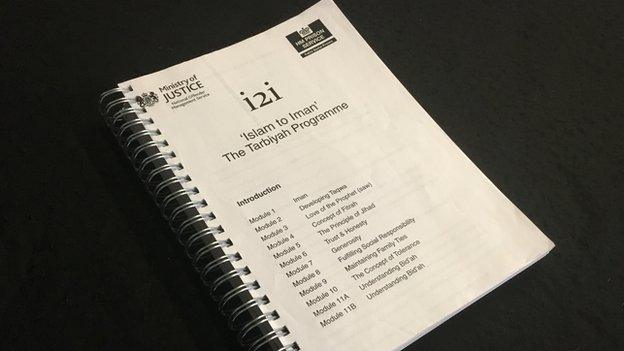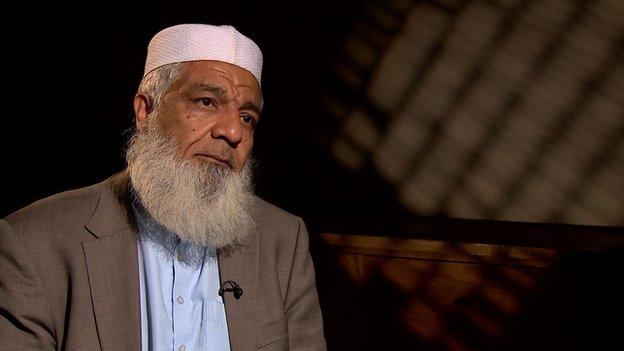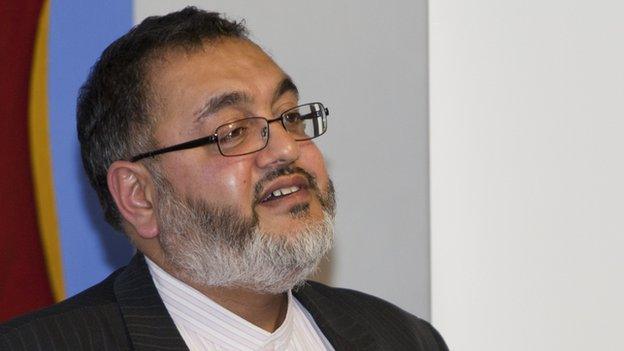Prison Islam course 'could turn prisoners to violence'
- Published

The BBC has obtained a copy of a manual used in prisons to teach inmates about Islam
A manual used by imams to teach prison inmates about Islam risks "turning people into jihadis", a cleric says.
Sheikh Musa Admani told the BBC the Tarbiyah programme, used in English and Welsh prisons since 2011, could turn people towards violence and should be withdrawn.
A section of the programme is on jihad, and it says taking up arms to fight "evil" is "one of the noblest acts".
The Ministry of Justice will investigate issues raised by the BBC.
The BBC understands that the Tarbiyah programme was co-written by a number of imams and Ahtsham Ali, a prisons adviser to the Ministry of Justice.
Mr Ali declined to comment.
Another teaching course was withdrawn by the department last year because it was based on texts written by extremists.
'Physical fight'
One section of the Tarbiyah programme is called "The Principle of Jihad".
In it, the imam is asked to discuss with prisoners the difference between "internal jihad" - the struggle for self improvement - and "external jihad" - the struggle against the enemies of Allah, which sometimes involves taking up arms.
It says: "There may necessitate a time to pick up arms and physical [sic] fight such evil... It is one of the noblest acts."
The course follows this section with a verse from the Koran.
Although both kinds of jihad are presented in the text, one expert says too much focus is placed on fighting jihad.
Sheikh Musa Admani, a chaplain and expert in interpreting Islamic texts, has worked extensively on anti-radicalisation programmes in the UK and abroad.
"This document sets out the steps and then addresses various forms of jihad and then goes on to emphasise a particular type ie. the killing and the fighting", he says.
"It incites people to take up arms... It prepares people for violence. It could turn people when they come out of prison, supposedly rehabilitated, back into violence."
Sheikh Admani says the course should not continue to be taught in prisons.
"It hinders all the aims that the Ministry of Justice might have to achieve peace and harmony. This document works against it, it doesn't add an iota to that good intention and they need to remove it as quickly as possible and then rehabilitate those who have learnt it."

Sheikh Musa Admani said the manual risks "turning people into jihadis"
'Critical point'
A former prison officer told the BBC some Muslim inmates at the high-security jail where he worked used to physically punish other Muslim prisoners for perceived misdemeanours.
"It wasn't just once, there were a number of occasions where prisoners' feet were severely battered," he said.
"Other incidents were prisoners being fined for not adhering to what they should be adhering to."
The prison officer said the "problem within prisons now is getting to a critical point", with "many Muslim prisoners basically taking over the law of the prison".
Vulnerable
Elsewhere, a former inmate at Belmarsh prison said the failure of some prison imams to confront extremists in jail was part of a wider issue.
"They [imams] know individuals have the capability to manipulate younger, impressionable offenders but they sit idle and just don't respond to it", he said.
"How do I know they're not responding to it? I lived in and amongst these young impressionable guys and I saw the conveyor belt of radicalisation in full effect."

Ahtsham Ali co-wrote the Tarbiyah programme
The former inmate said that although he had access to Salaam Peace, a community group, throughout his sentence, other prisoners were vulnerable to extremism while inside jail.
"People convicted of terrorism, people in the public domain that are very well known, are roaming around freely and being able to manipulate young minds.
"The fact they're able to learn the Tarbiyah programme and Arabic, coupled with the fact that inmates [convicted of terrorism] have access to extremist literature and narrations that aren't related to the prophet but they relate it to the prophet - coming from them it seems so realistic, you start believing this is the true Islam, the true Islam is [the militant group Islamic State] IS".
The Ministry of Justice will conduct an investigation into the issues raised by the BBC about the Tarbiyah programme.
In 2015 it appointed Ian Acheson to carry out an investigation into extremism and radicalisation in prisons. Publication of its findings has been delayed.
"Islamist extremism is one of the biggest threats facing this country", it said.
"That is why the justice secretary commissioned the first-ever review of Islamist extremism in prisons.
"As we have made clear, the report has been received and a summary document will be published in due course."